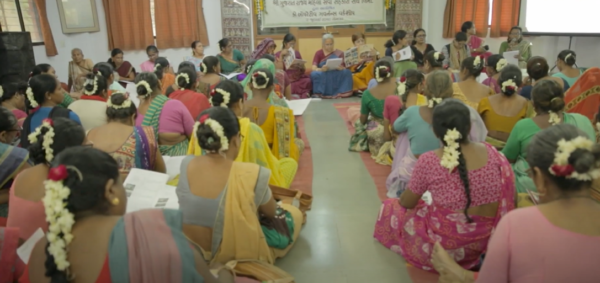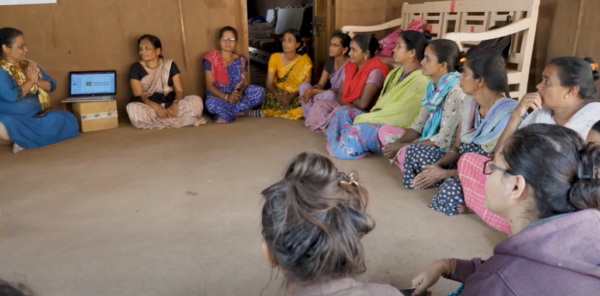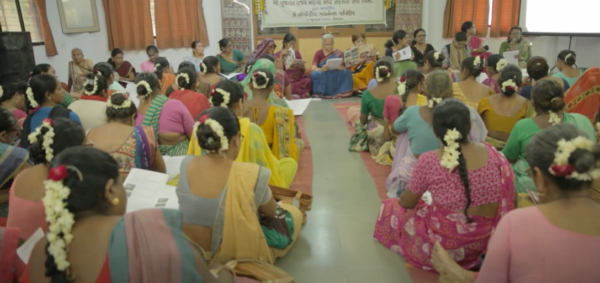International Women’s Day: Interview to SEWA
08 March 2024
In 2024 we are still struggling to close the gender gap, reduce inequalities and guarantee access to basic social protection schemes for women (pension, insurance, fair income). The 8th of March serves as a powerful reminder of women’s extraordinary resilience and power, particularly when they come together as collectives like cooperatives. As we reflect on the progress made, we also acknowledge the challenges that persist, inspiring us to strive together for gender equality and empowerment.
On International Women’s Day, we sit with Mirai Chatterjee, a leader of the Self-Employed Women’s Association, SEWA (India), Chairperson of the SEWA Cooperative Federation and board member of CICOPA, to talk about how worker cooperatives empower women in society. SEWA is an Indian value-based movement of unions and cooperatives focusing on women driving change. SEWA was created in 1972 as a trade union promoting the rights of women working in the informal economy, and it afterwards initiated several cooperatives to create fair employment and decent work for women.
Join us in this exploration of stories, accomplishments, and challenges of the women of SEWA, which is paving the way for a more inclusive and equitable future. Happy International Women’s Day!

CICOPA : Mirai, today as leader of SEWA you carry an important legacy, that of the women activists who founded the association, we especially remember the activist and lawyer Ela Ramesh Bhatt who passed away in 2022. Can you tell us what are the main challenges that self-employed women must face in today’s society?
Mirai Chatterjee (MC) : In today’s Indian society, the majority of women are self-employed (farmers, artisans, street vendors, small producers) and they face various challenges. Gender discrimination persists in our patriarchal society, in particular towards the most disadvantaged castes and communities in India. The primary challenges include a lack of work and income security, which is linked to food insecurity. At the same time, limited social protection for informal women workers, and difficulties accessing financial services are big challenges. Women need new skills to increase their incomes and to take part in the new economy, in particular to bridge the gender digital divide. Additionally, the role that women play in taking care of their families, their voice, visibility, and representation in leadership positions remain significant concerns. There are still very few women in the Indian Parliament and other leadership positions, even in policy committees working on issues that concern women.
Despite all these challenges, there is a strong women’s movement in the country, including millions of women’s Self-Help Groups (SHGs).
C : What does women’s empowerment mean to you, and what are the tools that cooperatives can/should provide to facilitate it?
MC : A colleague in SEWA described what empowerment meant to her: a thousand light bulbs lighting up in her body. Through economic empowerment (earning money) women become self-reliant, which allows them to achieve income, food security and financial independence. In cooperative enterprises, which I see as a laboratory for democracy and inclusion, women gain control of their lives and even their bodies through democratic decision-making processes. They gain more voice and representation in all aspects of their social lives and the economy – their families, their communities, the national and international spheres.
Being empowered also means being free from fear (from husbands, police, government officials, and elected officials), including the fear of speaking out with confidence. Empowerment is also a collective journey, emphasising the power of solidarity and learning from role models within the cooperative. SEWA’s tools for empowerment include specific leadership training and capacity-building courses, run by the SEWA Academy – our capacity-building institution. These courses prepare grassroots women leaders to contribute to social change and to value themselves within the SEWA movement, in society and in the economy.
C : In what ways does SEWA empower women, and what impact have you observed on the lives of its members?
MC : SEWA empowers women through the power of organising, building solidarity through unions and cooperatives, and fostering a supportive network. The organisation focuses on creating a strong grassroots foundation, leading to women emerging from poverty by utilising their talents and resilience. The impact on members’ lives is profound, as they collectively build their own paths and empower and uplift themselves, their families and their communities.
I invite you to watch this recent video we made which includes powerful testimonies from our network.

C : SEWA is a fascinating and powerful example, what are the key lessons learned that could serve other cooperatives or organisations around the world to support women’s empowerment?
MC : The main lessons that one could derive from SEWA is the importance of organising informal workers, bringing them together to build membership-based organisations, and combining unions with cooperatives to build workers’ solidarity for a more just and peaceful world. The union mobilizes thousands and thousands of workers to fight for their rights, their voice and visibility, supporting their path to economic empowerment. The cooperatives provide workers with livelihood, work, income, security and social protection. The cooperatives are owned, managed and used by the women themselves and are organised democratically and inclusively.
Secondly, SEWA is a value-based organisation sharing the values of Mahatma Gandhi, such as truth and nonviolence, but also respecting all faiths, promoting decentralized local employment and what Gandhi called “Swaraj” – self-rule. Swaraj is on the one hand working on the self, taking care of your ego and your prejudices, but it is also self-reliance. As I said before, work, income security, and social protection form the basics of life, and are essential to achieving self-reliance, financial autonomy, decision-making, control over one’s life, and visibility. We live in one of the most diverse countries in the world. All major religions are here, there are so many linguistic groups and ethnicities. SEWA today represents 2.9 million workers, 150 cooperatives and collectives. These common values are what have kept us together for 52 years.
Another key lesson is to put the women’s needs and demands at the centre of all actions in the organisation and in the leadership. It is well known that when women lead, then the whole family develops. This has been documented in country after country, and India is no exception. It is important to give women leadership, voice, and representation to drive social change.
Trying to guarantee your financial independence by having your own membership-based organisation which is financially viable is another important element. For instance, the SEWA Bank, the world’s first women’s cooperative bank started with 4,000 women pooling their daily income, and today more than 600,000 women are depositors. It has become a model that serves as inspiration also for smaller banks and cooperatives.
My advice is to start small, but dream big. You never know what is going to happen! As our founder, Elaben, taught us, if your values, heart and head are in the right place and the workers are in the centre, then you can never go wrong.
Finally, horizontal solidarity and the use of technology play vital roles for us, as does the acknowledgement that the cooperative movement must address centuries of poverty, gender and caste discrimination in India.
C : What do you think an organisation like CICOPA could do to better promote the empowerment of women workers?
MC : CICOPA can play an important role in promoting women’s cooperatives and highlighting the role they play not only for women’s economic empowerment, but in boosting local economies producing bottom-up development. CICOPA could also provide capacity-building support, ensure access to working capital for small women’s cooperatives, bridge the digital gap, and increase representation and voice in the global cooperative movement.
C : Are you planning any activities for the International Women’s Day?
MC : For the International Women’s Day, we plan to come together, sing empowering songs, dance our traditional folk dance called “’garba”, and celebrate sisterhood. We will also launch a new insurance program in a remote part of North East India, along with a climate change product, which will provide women workers with a small but useful compensation in case of extreme heat (300 Rupees per day, equivalent of 3 Euros) when it becomes impossible to work, especially for farmers, construction workers, street vendors, home-based workers and waste recyclers. For the 8th of March, our goal is to celebrate our journey so far and the achievements of sisterhood.
Thank you very much, Mirai!

